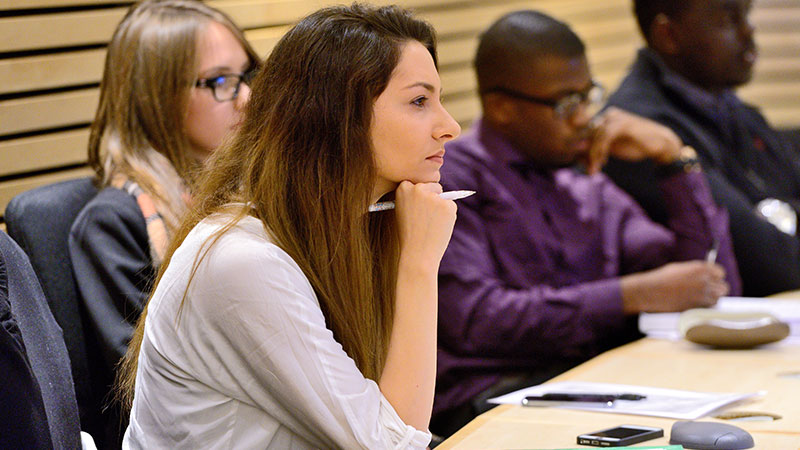Start dates: January 2024 / September 2024 / January 2025 / September 2025
Full time: 1 year or 2 years in sandwich mode which includes one year's full-time paid supervised work experience (a work placement). Sandwich mode is only available for September entry.
Part time: 24 months
Location: Headington
Department(s): Oxford Brookes Business School
Overview
How are business decisions made from a financial perspective? Do we need banks and stock markets to support economic growth? How do different financial markets operate? These are just some of the questions you’ll explore in our MSc Finance.
As well as gaining technical knowledge, you’ll develop practical skills in financial modelling and mathematical techniques. And you’ll gain an understanding of the broader issues of finance from our leading researchers in corporate social responsibility.
Don’t worry if you haven’t studied mathematics as your first degree. Our MSc Finance is for anyone who wants to move into this industry. We accept any subject from history to Japanese literature.
Our focus is on preparing you for the real world. You’ll be taught by experts from industry who will help hone your professional and digital skills. Plus, you’ll gain insights from high-profile guest speakers from companies like KPMG and Jaguar Land Rover.

Why Oxford Brookes University?
-
Industry and academia
Our experienced team is made up of leading researchers and financial experts with real world insights. This means you get an ideal mix of theory and practice.
-
Bloomberg Trading Suite
Develop your skills by using our interactive Bloomberg Terminals. Access data and analytics from companies, industries and markets in real time.
-
Small, interactive groups
We believe in active learning, so you’ll be involved in workshop activities, discussions and problem-solving initiatives.
-
International field trips
Broaden your experience with one of our international study trips to places like Boston. Visit major companies and organisations where you’ll see global business in practice.
-
Enhanced employability
Our course focuses on giving you the edge in business. We’ll work on your professional development, not just the technical side. That’s what employers are looking for.
Course details
Start this course in January
You have the option to start this course in January. You will study a range of modules between January and May. During the summer months of June, July and August you will study further modules and begin work on your dissertation. Between September and December you will complete your final modules and focus on your dissertation.
Study modules
Be industry ready when you graduateBy undertaking an optional work placement you can gain valuable and relevant industry experience and develop transferable skills such as communication, teamwork, networking and problem solving. A work placement can help you decide on your long-term career objectives and may lead to a job offer after graduation (would require visa sponsorship for international students).
The WAVES (Work and Voluntary Experience Service) or Careers Office will provide you with support and advice to get ahead in your career, and help you with your CV and applications. The team has access to a wide range of small, medium and large employers that offer postgraduate student work placements.
If you wish to pursue a placement at a particular company, our WAVES team can support you in making an approach to the company. Our Careers Office can also provide you with advice on how to use professional social media channels to pitch yourself to prospective employers.
Please note: As our courses are reviewed regularly as part of our quality assurance framework, the modules you can choose from may vary from those shown here. The structure of the course may also mean some modules are not available to you.
Research
There are two research clusters in the International Centre for Coaching and Mentoring Studies and the Centre for Diversity Policy Research and Practice which relate to this subject.

Careers
With our MSc Finance, there are various directions you can follow. You may decide to go into the finance sector and pursue a career in banking, trading, or insurance. Alternatively, you may choose a career in general business and take up a financial position within a national or international corporation.
Previous graduates have developed careers at prestigious global organisations such as Apple, Deutsche Bank, Citibank, IBM, and HSBC. Some have joined consultancy firms such as Accenture while others have chosen to work in financial roles in charities like Oxfam or Cancer Research.
Some of the roles you may go on to include:
- financial trader
- investment banker
- financial analyst
- fraud detection
- treasurer.
As well as increasing your financial knowledge and technical ability throughout the course, you’ll also develop desirable skills such as digital literacy, team working and presentation techniques.
Whichever path you take, you can be confident that a finance degree from Oxford Brookes will act as a springboard for many interesting careers.
Entry requirements
Specific entry requirements
A minimum of a second class honours degree (2:2) in any academic discipline, or equivalent overseas degree from a recognised institution or equivalent professional or other qualification.
Applicants who possess a diploma rather than a good degree may be eligible for entry provided they have compensatory work experience and can demonstrate career development.
This course attracts students from a wide range of backgrounds and nationalities. Applications are welcome from those in work and seeking continuing professional development.
Entry will also be subject to one satisfactory reference (academic).
Please also see the University's general entry requirements.
English language requirements
If English is not your first language you will need to satisfy the university’s English language requirements:
- IELTS minimum 6.0 (with a minimum of 6.0 in reading and writing and 5.5 in listening and speaking).
- if you have completed your undergraduate degree in the UK (at least one full year of study) you will automatically meet our English language requirements.
Please also see the University's standard English language requirements.
Pathways courses for international and EU students
We offer a range of courses to help you meet the entry requirements for your postgraduate course and also familiarise you with university life in the UK.
Take a Pre-Master's course to develop your subject knowledge, study skills and academic language level in preparation for your master's course.
If you need to improve your English language, we offer pre-sessional English language courses to help you meet the English language requirements of your chosen master’s course.
English requirements for visas
If you need a student visa to enter the UK you will need to meet the UK Visas and Immigration minimum language requirements as well as the University's requirements. Find out more about English language requirements.
Terms and Conditions of Enrolment
When you accept our offer, you agree to the Terms and Conditions of Enrolment. You should therefore read those conditions before accepting the offer.
International qualifications and equivalences
How to apply
Application process
Tuition fees
Questions about fees?
Contact Student Finance on:
Tuition fees
Fees quoted are for the first year only. If you are studying a course that lasts longer than one year, your fees will increase each year.
The following factors will be taken into account by the University when it is setting the annual fees: inflationary measures such as the retail price indices, projected increases in University costs, changes in the level of funding received from Government sources, admissions statistics and access considerations including the availability of student support.
How and when to pay
Tuition fee instalments for the semester are due by the Monday of week 1 of each semester. Students are not liable for full fees for that semester if they leave before week 4. If the leaving date is after week 4, full fees for the semester are payable.
- For information on payment methods please see our Make a Payment page.
- For information about refunds please visit our Refund policy page
Additional costs
Please be aware that some courses will involve some additional costs that are not covered by your fees. Specific additional costs for this course are detailed below.
Optional costs
| Additional costs | Amount (£) |
|---|---|
International Business in Practice Study Trip module (inc. accommodation for seven nights, insurance, company visits and group transportation for all activities). This fee did not include international airfare, visa application fee (if relevant), dinners and activities during your free time. |
£350-1500 |
It’s your responsibility to cover print / binding costs where coursework submission is required. Please note that a lot of the coursework is now submitted online. |
From £30 |
| You may choose to purchase books to support your studies. Many books on our reading lists are available via the Library, or can be purchased secondhand. | £20-60 per book |
Accommodation fees in Brookes Letting (most do not include bills) |
£94-265 per week |
Accommodation fees in university halls (bills included, excluding laundry costs) |
£122-180 per week |
Graduation costs include tickets, gowning and photography. Gowns are not compulsory but typically students do hire robes, starting at £41. |
Typically £0-200 |
Students are responsible for their own travel to and from university for classes. BrookesBus travel is subsidised for full-time undergraduate students that are on a course with a fee of £9,250 or more, or living in an Oxford Brookes hall of residence. There is an administration fee for the production of a BrookesKey. |
From £10 |
Funding your studies
Financial support and scholarships
Featured funding opportunities available for this course.
All financial support and scholarships
Programme changes:
On rare occasions we may need to make changes to our course programmes after they have been
published on the website. For more information, please visit our
changes to programmes page.

